- About MoD
Minister and Associates
- Minister
- State Secretary
- Assistant Ministers
- Secretary of the Ministry of Defence
Sectors
- Defence Policy Sector
- Human Resources Sector
- Material Resources Sector
- Budget and Finanance Sector
- Sector for Infrastructure and Hospitality Services
- SAF
- Documents
- Services
- Sport
- Archive
- Contacts
22.04.2014.
Presentation of Young Bosnia monograph
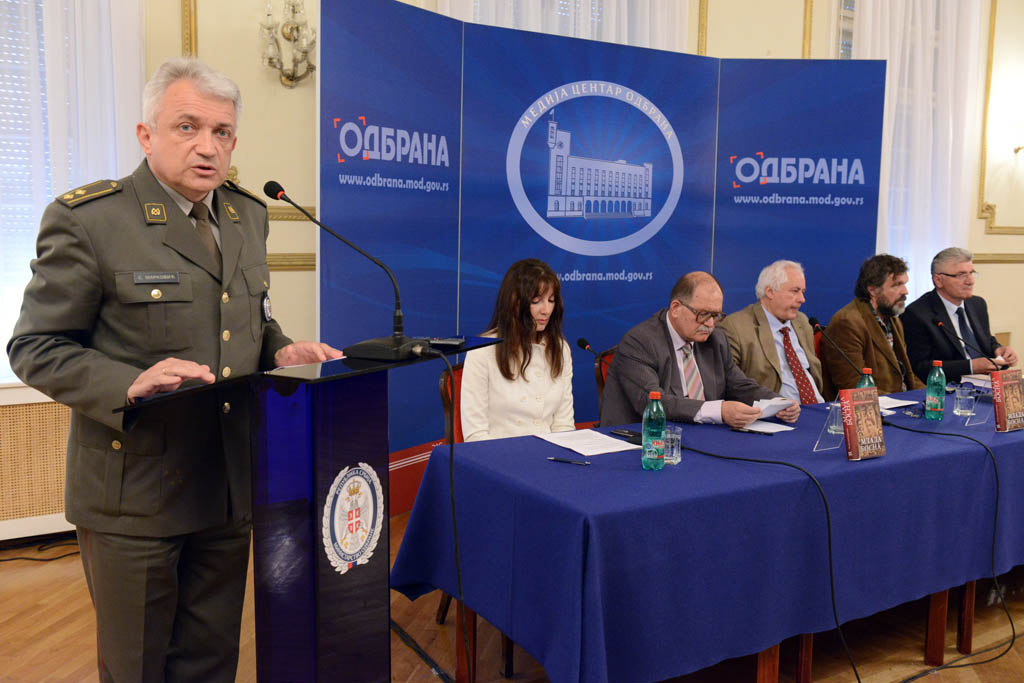 In the Central Military Club, Young Bosnia monograph by Professor Radoslav Gacinovic was presented. Promotion of the book was attended by Lieutenant-General Jovica Draganic, Deputy Chief of General Staff, with his associates, representatives of the Ministry of Defence and the SAF, MoI, Orthodox Church, Belgrade University, numerous historians and lovers of history and the written word. All of them were greeted on behalf of Odbrana Media Centre by Lieutenant Colonel Slavoljub Markovic, who pointed out at the beginning that the monograph seeks to illuminate in depth, in an interdisciplinary manner, the dimension of the events of the early 20th century who changed the course of history with great sacrifice.
In the Central Military Club, Young Bosnia monograph by Professor Radoslav Gacinovic was presented. Promotion of the book was attended by Lieutenant-General Jovica Draganic, Deputy Chief of General Staff, with his associates, representatives of the Ministry of Defence and the SAF, MoI, Orthodox Church, Belgrade University, numerous historians and lovers of history and the written word. All of them were greeted on behalf of Odbrana Media Centre by Lieutenant Colonel Slavoljub Markovic, who pointed out at the beginning that the monograph seeks to illuminate in depth, in an interdisciplinary manner, the dimension of the events of the early 20th century who changed the course of history with great sacrifice.- Based on the presented facts it can be clearly established that the Young Bosnia organization was a youth liberation movement, which included members of all peoples in Bosnia and Herzegovina and that the movement emerged solely in Bosnia and Herzegovina, as a response to decades of brutal violence conducted by the Austro-Hungarian monarchy", Lieutenant Colonel Slavoljub Markovic said and promised a series of new publications and activities of the Media Centre in marking of the centenary since the outbreak of the First World War.
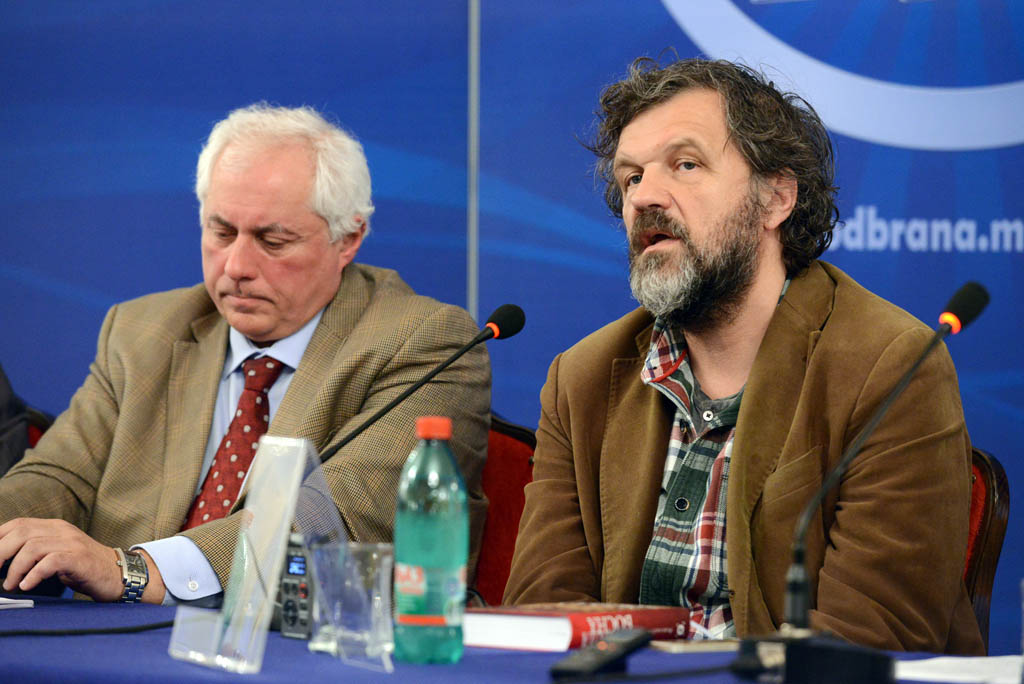 After that, the speakers about the book were Prof. Ljubodrag Dimic, a corresponding member of the Serbian Academy of Sciences and Arts and full professor in the Department of History, Faculty of Philosophy, Emir Kusturica, the famous film director and member of the Serbian Academy of Sciences and Arts, Prof. Darko Tanaskovic, one of the reviewers of the book, a member of the European Academy of Sciences and Arts, former FRY Ambassador to Turkey and Azerbaijan, and Ambassador Extraordinary and Plenipotentiary to the Holy See, and Radoslav Gacinovic, PhD, the author of the monograph.
After that, the speakers about the book were Prof. Ljubodrag Dimic, a corresponding member of the Serbian Academy of Sciences and Arts and full professor in the Department of History, Faculty of Philosophy, Emir Kusturica, the famous film director and member of the Serbian Academy of Sciences and Arts, Prof. Darko Tanaskovic, one of the reviewers of the book, a member of the European Academy of Sciences and Arts, former FRY Ambassador to Turkey and Azerbaijan, and Ambassador Extraordinary and Plenipotentiary to the Holy See, and Radoslav Gacinovic, PhD, the author of the monograph.Presenting the members of the Young Bosnia as a generation that had a vision of freedom and the task to bring the process of national awakening of the oppressed peoples of Austria-Hungary to an end, Dr. Ljubodrag Dimic pointed out their willingness to give their own lives as guarantee to achieve the unquestionable ideals.
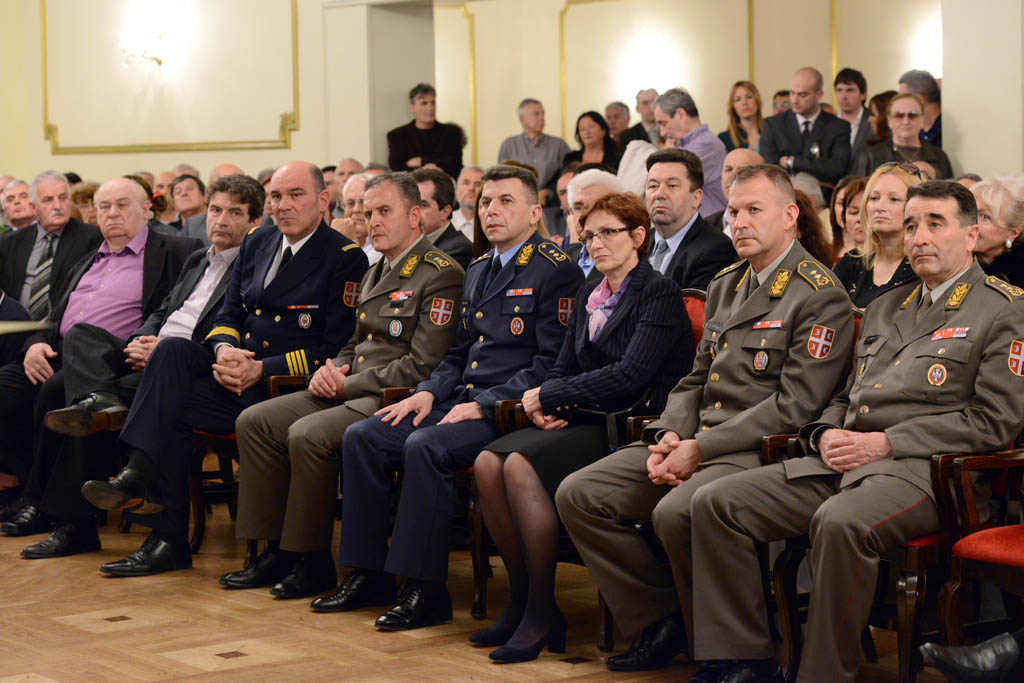 - That generation, who dreamed of freedom and planned feats like the Zerajic's one, is the one that was spoken about and extensively documented in the Young Bosnia monograph. They were ready for personal sacrifice and they deserved our remembrance, which is also manifested in the monograph. Its compositional relief, in addition to the introductory considerations, comprises 10 illustrations and 16 chapters in which the material is exposed in 13 units. It presents the time before the Sarajevo assassination, the events and developments that caused it, the reasons why the youth had to rise up and why, in the late 19th and early 20th century, a revolutionary and liberating national organization Young Bosnia evolved and emerged. At the end, it gives the analysis of the events that followed the Sarajevo assassination, Dr. Ljubodrag Dimic said among other things.
- That generation, who dreamed of freedom and planned feats like the Zerajic's one, is the one that was spoken about and extensively documented in the Young Bosnia monograph. They were ready for personal sacrifice and they deserved our remembrance, which is also manifested in the monograph. Its compositional relief, in addition to the introductory considerations, comprises 10 illustrations and 16 chapters in which the material is exposed in 13 units. It presents the time before the Sarajevo assassination, the events and developments that caused it, the reasons why the youth had to rise up and why, in the late 19th and early 20th century, a revolutionary and liberating national organization Young Bosnia evolved and emerged. At the end, it gives the analysis of the events that followed the Sarajevo assassination, Dr. Ljubodrag Dimic said among other things.Speaking about the Serbian national issue and the creation of Young Bosnia, Emir Kusturica emphasized that serf position of the enslaved people in Austro Hungarian monarchy could not produce anything more than a rebellion of the younger generations against slavery.
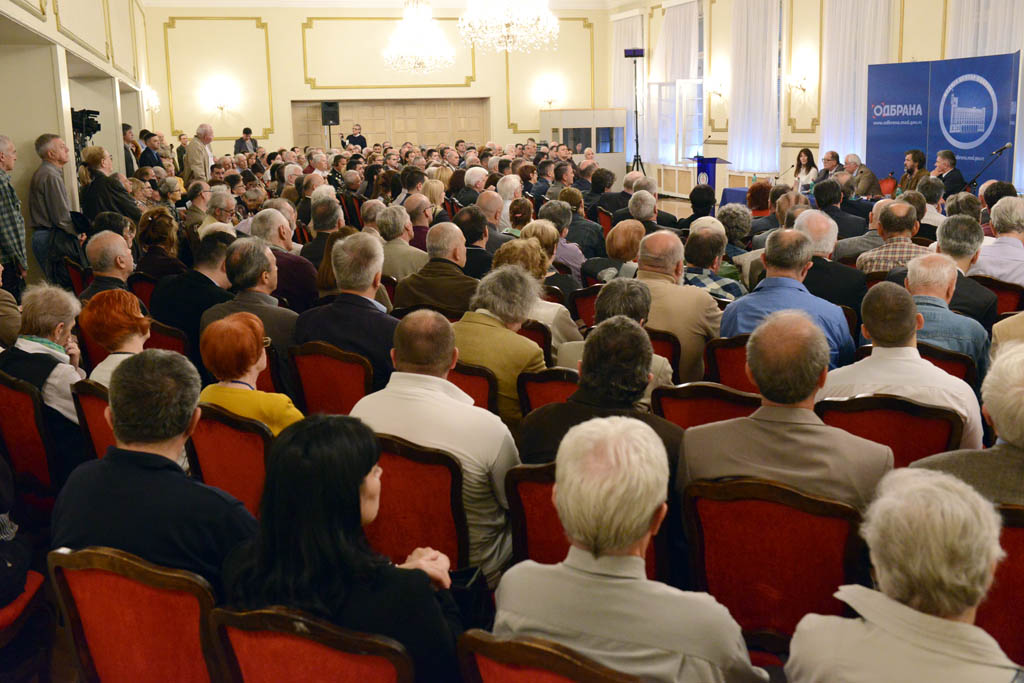 - When you mention the Serbian national issue, at the moment when you put that unresolved issue on the table, you become a nationalist. Such an attitude of the developed world towards our people which is characteristic of the time about which the monograph by Professor Gacinovic speaks has not stopped even today. That's why we correctly understand the members of Young Bosnia, we understand them as fighters for freedom, the Yugoslav idea, for the liberation under the Austro-Hungarian yoke. That state of mind, then present among young people sentenced to life in the only remaining colony in Europe in the early 20th century, we know very well. And we know that it was not possible to get liberated from that slavery otherwise but by killing the tyrant. Today's revision of historical circumstances, events and everything that happened before, during and after the Sarajevo assassination, clearly shows bad intention of revisionists who do not hesitate to distort the truth, Emir Kusturica underlined.
- When you mention the Serbian national issue, at the moment when you put that unresolved issue on the table, you become a nationalist. Such an attitude of the developed world towards our people which is characteristic of the time about which the monograph by Professor Gacinovic speaks has not stopped even today. That's why we correctly understand the members of Young Bosnia, we understand them as fighters for freedom, the Yugoslav idea, for the liberation under the Austro-Hungarian yoke. That state of mind, then present among young people sentenced to life in the only remaining colony in Europe in the early 20th century, we know very well. And we know that it was not possible to get liberated from that slavery otherwise but by killing the tyrant. Today's revision of historical circumstances, events and everything that happened before, during and after the Sarajevo assassination, clearly shows bad intention of revisionists who do not hesitate to distort the truth, Emir Kusturica underlined.The latest revisionist ventures of biased historians and theorists of the new world order were addressed by one of the reviewers of the Young Bosnia monograph, Darko Tanaskovic, who pointed out that attempts to outwit the truth and "redecorate" the history are almost regularly repeated from time to time, "always in critical periods of history".
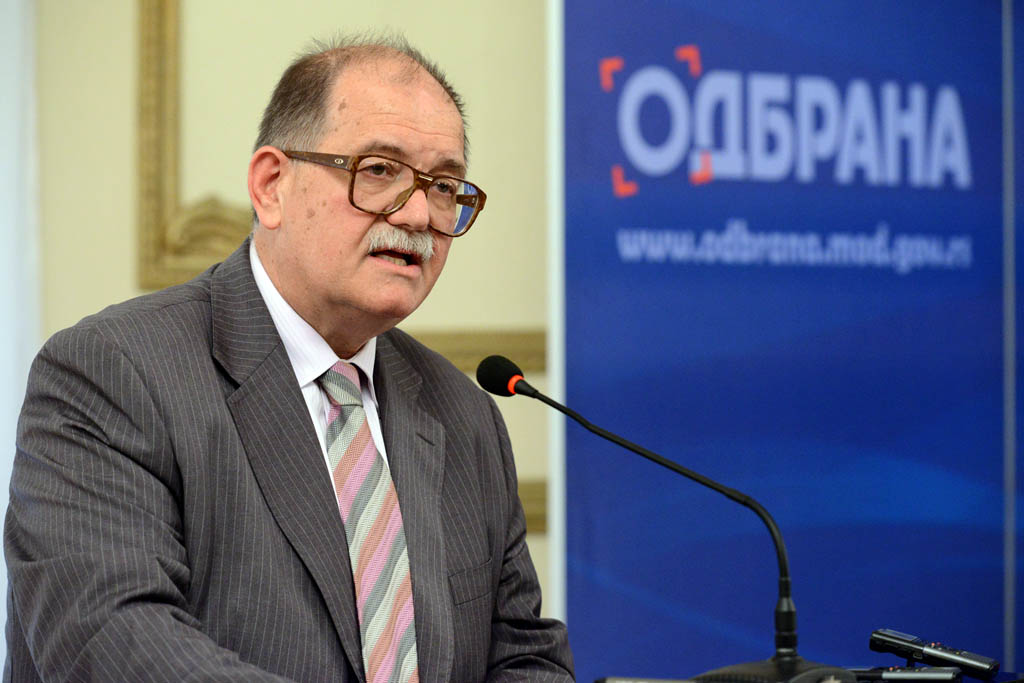 - Brutal attempts of revision happen always when some world order is to be established, denied or destroyed. Young Bosnia has also been faced with these attempts. This book convincingly brings back that organization to itself, and therefore to us, beyond all scientific, political and quasi-political controversies. It brings it back to what is undeniable in it, the human dimension, deep devotion and non-extinguished desire for freedom. Young Bosnia movement embodies exactly that devotion of its people to freedom, the ideal to which bier the Young Bosnians laid their lives, Dr. Tanaskovic said.
- Brutal attempts of revision happen always when some world order is to be established, denied or destroyed. Young Bosnia has also been faced with these attempts. This book convincingly brings back that organization to itself, and therefore to us, beyond all scientific, political and quasi-political controversies. It brings it back to what is undeniable in it, the human dimension, deep devotion and non-extinguished desire for freedom. Young Bosnia movement embodies exactly that devotion of its people to freedom, the ideal to which bier the Young Bosnians laid their lives, Dr. Tanaskovic said.Speaking about the motives which inspired him to write the Young Bosnia monograph, Dr. Radoslav Gacinovic said that every time seeks and finds its heroes and the books like his are the initial primer on the road to a better knowledge of its people and its history.
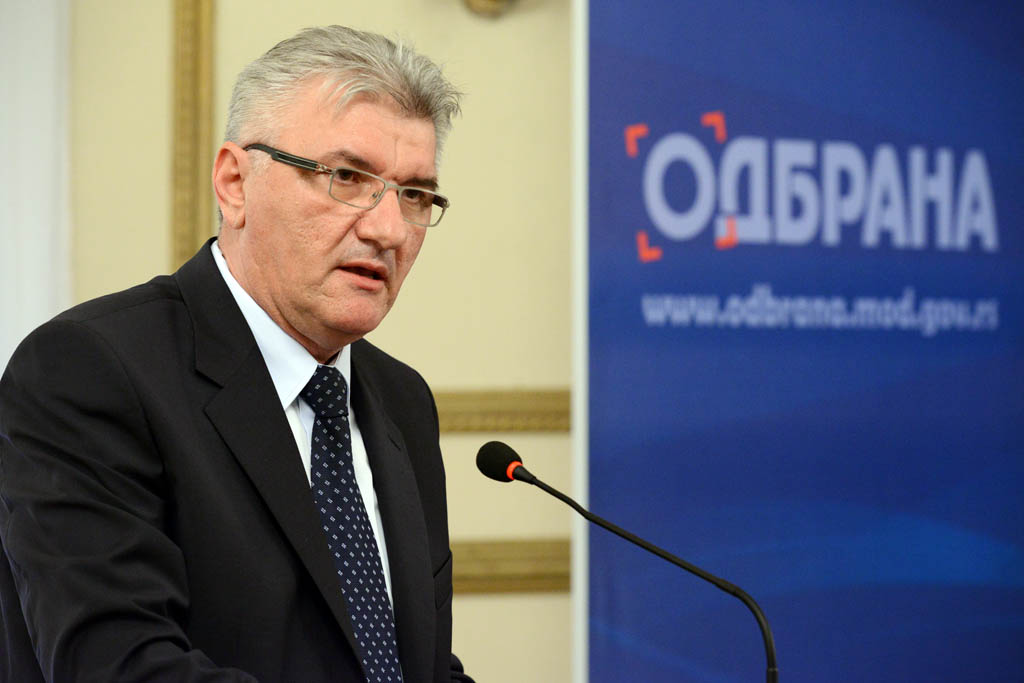 - Inhuman living conditions in the Austro-Hungarian monarchy had to lead to creation of a liberation organization to which Ivo Andric belonged, and to which many prominent intellectuals, artists, writers, composers, scientists, patriots of that time belonged. My direct ancestor, Vladimir Gacinovic, founder and ideologist of the Young Bosnia movement also belonged to it. There is no doubt that the attack on the man was reality of life under the rule of the Austro-Hungarian royal family. Its epitome was the Archduke Franz Ferdinand, the man who had repeated his many times expressed position before leaving for Sarajevo that he is not interested in people in Bosnia and Herzegovina "who do not exist, there are only Austrian flags." Bearing all this in mind, we can understand the tendency of Young Bosnians to remove the representative of such authority just in Sarajevo, where there are no people, but only the flags, Professor Radoslav Gacinovic said among other things.
- Inhuman living conditions in the Austro-Hungarian monarchy had to lead to creation of a liberation organization to which Ivo Andric belonged, and to which many prominent intellectuals, artists, writers, composers, scientists, patriots of that time belonged. My direct ancestor, Vladimir Gacinovic, founder and ideologist of the Young Bosnia movement also belonged to it. There is no doubt that the attack on the man was reality of life under the rule of the Austro-Hungarian royal family. Its epitome was the Archduke Franz Ferdinand, the man who had repeated his many times expressed position before leaving for Sarajevo that he is not interested in people in Bosnia and Herzegovina "who do not exist, there are only Austrian flags." Bearing all this in mind, we can understand the tendency of Young Bosnians to remove the representative of such authority just in Sarajevo, where there are no people, but only the flags, Professor Radoslav Gacinovic said among other things. PHOTOGALLERY
PHOTOGALLERY- About MoD
- Jurisdiction
- Organisation scheme
- Description of duties
- Minister and Associates
- Minister
- State Secretary
- Assistant Ministers
- Secretary of the Ministry of Defence
- Sectors
- Defence Policy Sector
- Human Resources Sector
- Material Resources Sector
- Budget and Finanance Sector
- Sector for Infrastructure and Hospitality Services
- Special Internal Units
- Office of the Minister of Defence
- Secretariat
- Military Attorney's Office
- Administrative Bodies within MoD
- Defence Inspectorate
- Military Intelligence Agency
- Military Security Agency
- Autonomous Departments
- Public Relations Department
- Military Healthcare Department
- Higher Education Institution
- Defence University
- Specific internal units
- Inspector General of the Services
- Internal Audit Section
- SAF
- Documents
- Services
- Sport
- Archive
- Contacts

